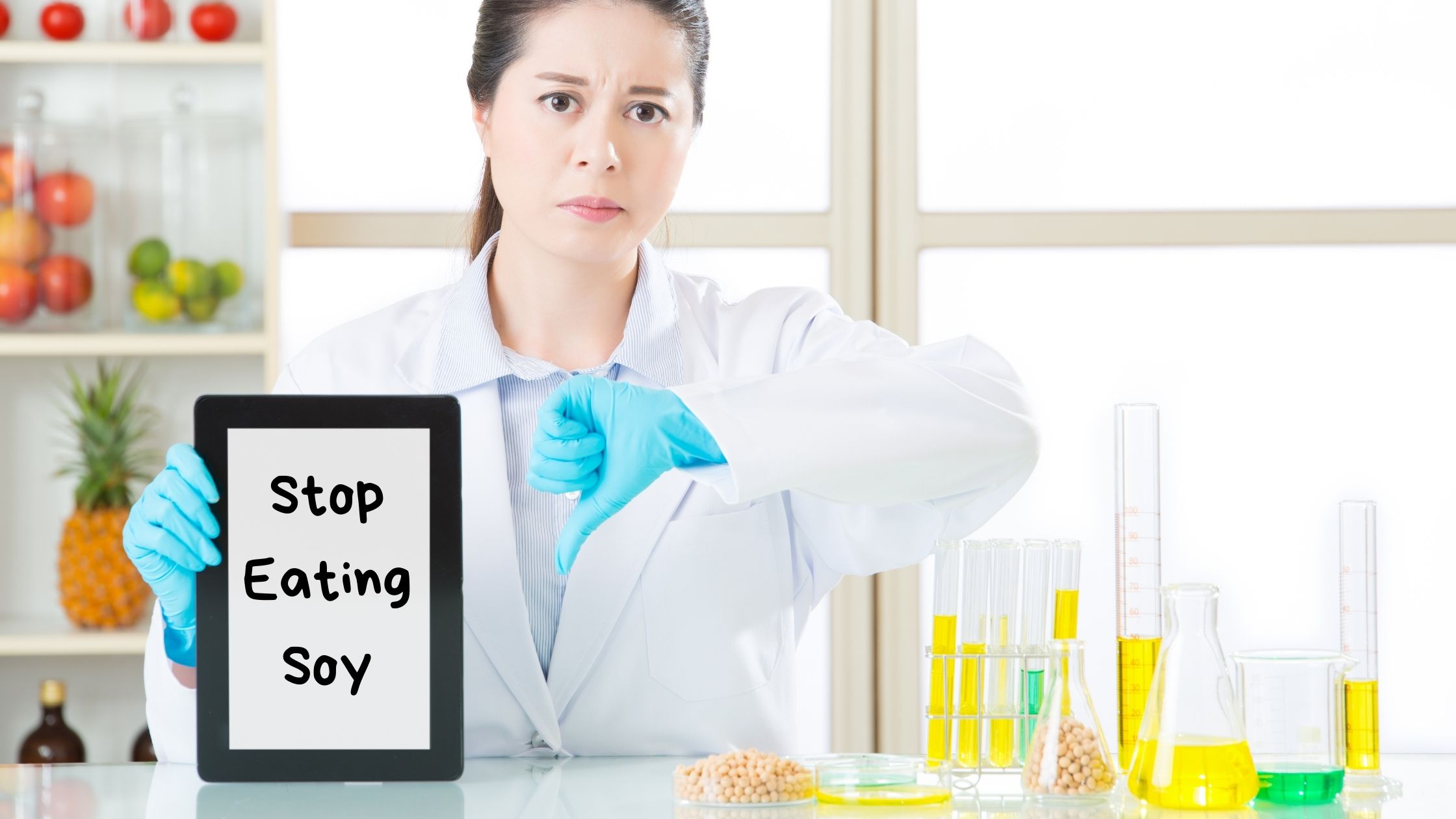Is Soy Bad for You? Why You Should Stop Eating Soy NOW!
If you have been avoiding dairy for several years now, you probably remember a time when soy was predominately the only commercially available dairy alternative for things like milk, cheese, yogurt, and coffee creamer. Thankfully, there are several much healthier options available today.
In this post I summarize a chapter from Nora T. Gedgaudas book Primal Body Primal Mind, Beyond the Paleo Diet for Total health and a Longer Life. This is an absolute must read for anyone interested in understanding the evolution of the human diet, and how a clean keto diet translates to improved health, proper weight management, and longevity.
Is Soy Even Food?
Soy (particularly tofu, soy milk, and soy protein isolate) is actually a very new addition to the human diet, and historically was not fit for human consumption.
Genetic engineering, and chemical processing methods created by corporate interests have made soy products palatable, but is it actually food, and should you eat it?
Due to the overwhelming research that has identified the deleterious effects of soy consumption on human health, many substances derived from soy have not been given the Generally Recognized as Safe status (GRAS) by the FDA, and this status has been or is in the process of being revoked from some soy-based products that had prematurely received approval.
Why is Soy Advertised as Healthy?
Like many other agricultural products, such as corn and wheat, soy is a huge multibillion-dollar, multinational industry that invests massive amounts of money into marketing.
They also fund private studies that are purposely skewed to help convince the public that soy is healthy, while independent research however has confirmed otherwise.
What Makes Soy So Bad?
Soy contains antinutrients, which are substances that in some way or another interfere with healthy processes within the body.
The high levels of phytic acid (phytates) in soy, for instance, can reduce the absorption of calcium, magnesium, copper, iron, and zinc. Phytates may not be as detrimental in people with well-balanced diets, but can be extremely problematic for those whose diet is already low in minerals and/or trace elements.
Grains, legumes and nuts are also high in phytates. Grains and legumes are not commonly consumed on a keto diet, but nuts often are, and should be consumed in moderation.
Trypsin inhibitors also present in soy interfere with protein digestion and contribute to pancreas disorders.
Soy polyestrogens disrupt endocrine function, and have been linked to infertility and breast cancer. These polyestrogens are also potent antithyroid agents that are linked to hypothyroidism and may contribute to thyroid cancer.
Soy also contains vitamin B12 and D analogs, increasing the body’s requirement for these vitamins. Soy foods contain high amounts of aluminum, which is toxic to the nervous system and kidneys, and high amounts of hemagglutinin, which causes red blood cells to clump.
Cascading Effects of Soy

The issues mentioned above may not seem that bad until you follow the effects a little further.
As a phyto-endocrine disrupter, soy has been linked to autoimmune thyroiditis (a disease in which the body interprets the thyroid gland and associated hormones as threats and creates antibodies to destroy them), and hypothyroidism which results in sluggishness of all physiological functions leading to things like low blood pressure, slow pulse, depressed muscular activity, cold intolerance, obesity, and dry skin and hair.
Consuming estrogenic foods can increase the risk of breast cancer and alter menstrual cycle length in women. Estrogens can also pass through the placenta resulting in malformations and functional deficiencies in a developing fetus.
Babies fed soy infant formula have estradiol levels 13,000 to 22,000 times higher than babies fed milk-based infant formula. This has been likened to the equivalent of five birth control pills consumed daily.
In male infants this can interfere with proper testosterone production and may cause inhibition of male characteristics and sexual organs.
Soy consumption also causes decreased testosterone in men, and has been purposely consumed by Buddhist Monks in order to reduce their libidos. Soy inhibits the conversion of testosterone to estradiol, which is necessary for male brain function and has also been linked to higher risk of vascular Alzheimer’s disease in men.
In female infants, dietary soy has been found to drastically speed the rate of maturation. In a study by Herman-Giddens et al. 1997, girls that consumed soy entered puberty much earlier than normal, several showed signs of maturation including pubic hair and breast development before the age of 8, and even as early 3 years old.
It Gets Worse
Soy protein isolate, the main ingredient in many meat and dairy alternative products, is heavily processed in order to remove inherent antinutrients.
The soybeans are first mixed with an alkaline solution to eliminate fiber, then separated in an acid wash, and again neutralized in an alkaline solution.
The precipitated curd is spray-dried at high temperatures to produce a high-protein powder, and the process of making texturized vegetable protein requires additional exposure to heat and pressure which creates carcinogenic nitrates from the denaturing of the original protein structure.
Monosodium Glutamate (MSG), a powerful neurotoxin, is then often added under the guise of “natural flavors”.
As if that wasn’t bad enough, food manufacturers are using a gasoline additive called hexane to process soy products, and some vegetable oils. Sampling conducted by an independent lab found hexane residue in several soy-based products; however, the FDA does not require testing for hexane, even in baby foods.
Soy is the Single Most Genetically Modified Crop

More then 93% of soy has been genetically modified in some way or another. Food manufacturers often defend the use of genetically modified organisms (GMOs) in crop production by suggesting that these foods have been engineered to be “more nutritious”, but this is extremely deceptive.
Crops are most commonly modified to grow in nutrient deficient soils, and to withstand the applications of chemical herbicides or pesticides.
They may also be modified to contain or produce their own pesticides, which then have to be neutralized during processing in order for them to be “safe” for human consumption.
GMO foods have been linked to numerous health hazards, and should be avoided whenever possible. This will likely become more difficult to do however, as food manufacturers are fighting hard to keep from having to identify GMO sourced ingredients on their food labels.
Are There Any Safe Forms of Soy?
Fermented forms of miso, natto, and tempeh (organic and non-GMO preferably) may be slightly safer soy options.
The fermentation process largely neutralizes trypsin inhibitors and phytic acid, however the goitrogens, or thyroid inhibitors, remain intact.
Additional Resources
For a further understanding of GMOs and soy, Nora. Gedagaudus recommends the following resources:
The Future of Food (Documentary)
Seeds of Deception (Book by Jeffrey Smith)
We also suggest checking out Nora’s website (www.primalbody-primalmind.com) and books Primal Body Primal Mind, and Primal Fat Burner.
Do you currently consume soy? What has been you experience with or without soy in your diet? Please consider sharing your experience by commenting below in order to help others living a fit keto lifestyle.
Thank you for visiting LiveFitKeto.com. Check back often for new content or subscribe to our newsletter to receive updates on new articles, and if you have found this information helpful, please don’t hesitate to share.







